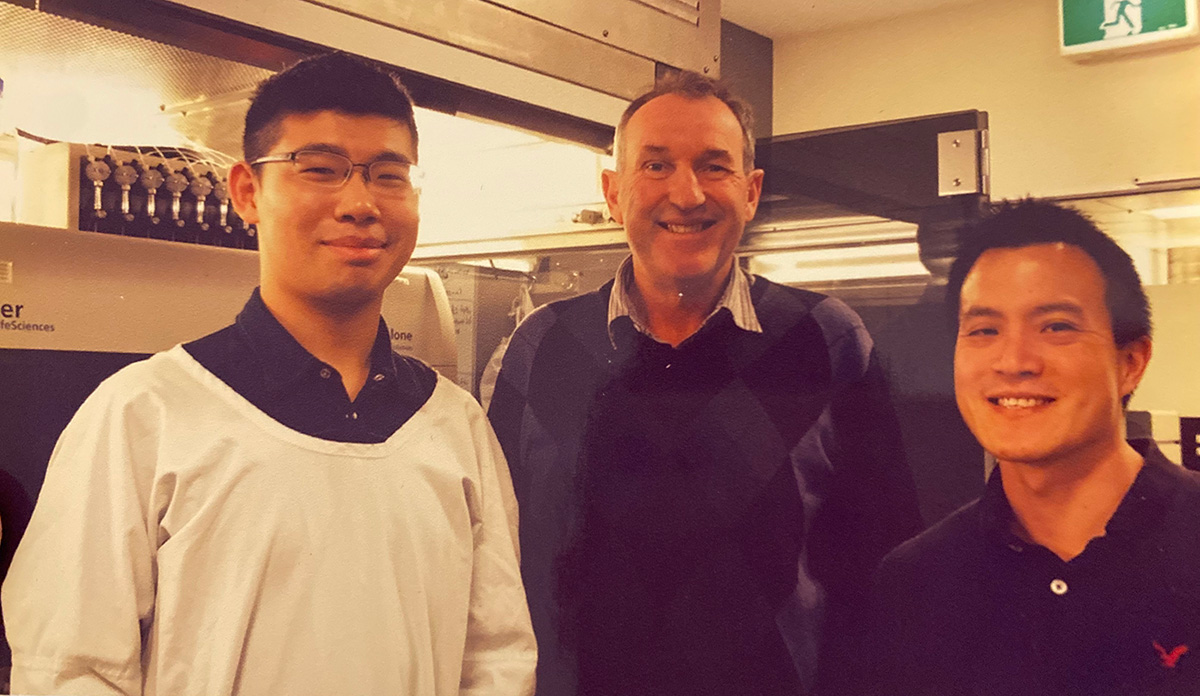4 Minute read
Life after graduate research: Dr Shunfei Yan
Dr Shunfei Yan’s passion for taking medical research from the laboratory into the clinic was kindled during his PhD at the University of Melbourne. He now helps researchers and pharmaceutical companies connect their research outcome with unmet medical needs.
Dr Shunfei Yan finished his PhD in Medicine, Dentistry and Health Sciences at the University of Melbourne in 2019. His work on improving treatments for ovarian cancer helped him discover a love of medical research that will directly benefit patients.
“I worked at the Peter MacCallum Cancer Centre – the big purple building there. My mentor and my supervisor was Professor Rick Pearson, the emeritus Associate Director of Laboratory Research at Peter Mac,” says Dr Yan.
Peter Mac is a specialist public cancer hospital in Melbourne. During his five years at the University of Melbourne, Dr Yan worked closely with university researchers as well as hospital staff.

Collaboration is not a choice, it’s a must. Every one of us, we know only one part of our study areas. Dr Shunfei Yan
“Sometimes you need to rely on others’ help. Other people who are specialised in other areas can help you.”
During his PhD, Dr Yan found a genetic pair that helps the cancer drug CX-5461 to treat ovarian cancer. He also identified a drug combination to significantly improve this treatment.
“When we talk about curing cancer, that is really, really difficult. What we can do is to extend the survival of the patient as long as possible with acceptable toxicity,” Dr Yan says.
Choosing the University of Melbourne for a PhD in medicine
When choosing a university for his graduate research degree, reputation was important to Dr Yan.
“The University of Melbourne has a very good research reputation, definitely,” Dr Yan says.
He also enjoyed Australia’s unique wildlife, saying, “You can complete your study with possums and kangaroos and cockatoos!”

A scholarship Dr Yan received gave him the freedom to focus on scientific research. Under a partnership agreement renewed in 2023, the University of Melbourne and the China Scholarship Council will support up to 180 PhD candidates to conduct their research at the university until 2027.
The student services Dr Yan used most during his time at the university were the libraries to access scientific research, the health centre and the university’s sports facilities.
“You can get healthy, happy and have enough energy to carry out research,” he explains.
Learn more about our graduate research options
A career in translating medical research into the clinic
As a graduate researcher in medicine, Dr Yan could also draw on the facilities and expertise available in the Melbourne Biomedical Precinct. In one location, the precinct brings together more than 40 research, education and industry partners that have been delivering medical care, research and education in Victoria for more than 160 years.
“There is lots of scientific research that will stay in the laboratory forever. It can never be translated into clinic. But my program determined that what you do matters. What you do can save lives,” Dr Yan says.
After graduating, Dr Yan took his passion for translating research and made it into his career. Following several years working in venture capital, he now works as Medical Evaluation Manager for AstraZeneca, one of the largest pharmaceutical companies in the world.

I am responsible for searching for and evaluating external innovation opportunities. These opportunities may include drug combination collaborations with other pharmaceutical companies, academia-industry research collaborations and asset licensing. Dr Shunfei Yan
“Currently I am focusing on oncology but may expand to other disease areas later," Dr Yan says.
The scientific sense he developed during his graduate research degree has been crucial to succeeding in his career. Evaluating scientific literature continues to be a part of his work.
Advice for new graduate researchers
Dr Yan’s advice to new graduate researchers is to make the most of the time you have at one of the world’s best universities. But you should also plan for what you want to do after graduation as early as possible.
“For example, if you want to go into the pharmaceutical industry, then it will be better if you could take part in some projects related to drug development,” he says.
To succeed in a PhD, Dr Yan says you need to know how to ask the right questions.
“If you want to solve a scientific problem, you first need to ask the right question to identify the key points in the whole problem. Then you try to solve that,” he says.
But the most important thing is to have passion for your area of research.
“Follow your heart!”
Learn more about a PhD in Medicine, Dentistry and Health Sciences
First published on 20 March 2024.
Share this article
Keep reading
-
Why research with us
Explore the benefits of undertaking your graduate research at the University of Melbourne.
-
Your research options
Explore your options as a graduate researcher at the University of Melbourne.
-
Your study experience
Discover what it's like to be a graduate researcher. Find out about University life, support services, and opportunities for skills development.
-
How to apply
Find out how to apply for graduate research at the University of Melbourne.